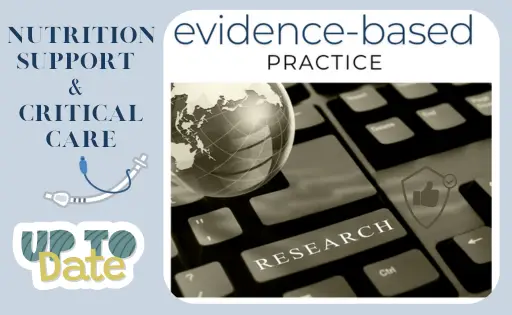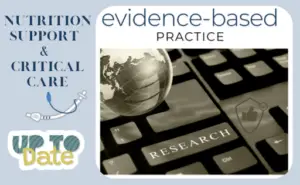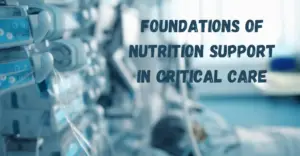By Bridget Storm MA, RD, LDN, CNSC
In the ever-evolving field of healthcare, staying current with nutrition support guidelines is crucial for providing optimal patient care. However, many practitioners still rely on outdated resources that may not reflect the latest research and best practices. The current edition of ASPEN’s Core Curriculum and the 2016 ASPEN/SCCM Adult Nutrition Support Critical Care Guidelines include research published through 2013. These guidelines were revisited in 2021, but only evaluated five clinical questions. Significant research has emerged throughout and post-COVID. This blog aims to shed light on the challenges posed by outdated nutrition guidelines and offer strategies for navigating this complex landscape.
Understanding the Importance of Updated Guidelines
Nutrition support is a vital component of patient care, particularly for those with specific medical conditions, undergoing surgery, or recovering from illness. Outdated guidelines can lead to suboptimal nutritional interventions, which may hinder recovery, prolong hospital stays, or even increase mortality rates. For instance, the American Society for Parenteral and Enteral Nutrition (ASPEN) and the Academy of Nutrition and Dietetics (AND) regularly update their guidelines based on emerging evidence. Relying on older versions could mean missing out on critical updates regarding the types, amounts, and routes of nutrition support. The European Society for Parenteral and Enteral Nutrition (ESPEN) is an additional resource providing international nutrition support guidelines.
Strategies for Navigating Outdated Guidelines
1. Continuous Education and Training
Healthcare providers must commit to lifelong learning. Attending workshops, webinars, and conferences can provide insights into the latest research in nutrition support. Organizations like ASPEN and AND offer resources that can help practitioners stay informed about best practices and new guidelines.
2. Collaborating with Nutrition Experts
Registered Dietitians are invaluable resources when it comes to interpreting and implementing nutrition support guidelines. Collaborating with these experts can ensure that patient care is based on the most recent evidence. Interdisciplinary teams that include nutrition professionals can enhance patient outcomes through tailored nutritional interventions.
3. Utilizing Technology and Resources
Access to reliable databases and online resources can aid in quickly finding updated guidelines. Platforms like PubMed, Cochrane Library, and clinical practice guidelines from reputable organizations can serve as go-to sources for the latest research. Additionally, dietetic practice groups and membership portals can offer opportunities to collaborate with other dietitians on specific questions or topics and sharing of best practice.
4. Critically Evaluating Guidelines
Not all guidelines are created equal. Practitioners should assess the quality of the evidence supporting specific recommendations. Many nutrition guidelines are based on expert consensus due to ethical limitations with conducting randomized-controlled research studies. Tools such as the AGREE II instrument can help evaluate the rigor and relevance of clinical practice guidelines.
5. Advocacy for Change
Healthcare practitioners can play a role in advocating for the adoption of updated guidelines within their institutions. By presenting evidence of the benefits of updated practices and engaging in discussions with policymakers, clinicians can help foster an environment that prioritizes current research in nutrition support.
In Summary
Navigating outdated nutrition support guidelines is a significant challenge in healthcare. However, by committing to continuous education, collaborating with nutrition experts, utilizing modern resources, critically evaluating guidelines, and advocating for change, healthcare providers can enhance patient care and outcomes. Staying informed and adaptable in this dynamic field is crucial for ensuring that patients receive the best possible nutritional support based on the latest evidence.
By embracing the latest evidence and fostering a culture of inquiry, healthcare professionals can significantly improve the quality of nutrition support provided to patients, ultimately leading to better health outcomes.
Visit me at https://nutritionstudysupport.com for more blogs, resources, and valuable insights!
Interested in increasing your proficiency in nutrition support? Check out our CNSC Study Guide and our training guide: Feeding the Critically Ill & GI Compromised.
References:
- Mueller CM, et al (Eds). The ASPEN Adult Nutrition Support Core Curriculum, 3rd Edition. ASPEN 2017.
- Compher C, Bingham AL, McCall M, et al. Guidelines for the Provision and Assessment of Nutrition Support Therapy in the Adult Critically Ill Patient: The American Society for Parenteral and Enteral Nutrition. JPEN. 2022; 1-30. https://doi.org/10.1002/jpen.2267
- McClave, SA et al. Guidelines for the Provision and Assessment of Nutrition Support Therapy in the Adult Critically Ill Patient: Society of Critical Care Medicine (SCCM) and American Society for Parenteral and Enteral Nutrition (A.S.P.E.N.). JPEN. 2016; 40 (2): 159-211.
- Martindale R, Patel JJ, Taylor B, Warren M, and McClave SA. Nutrition Therapy in the Patient with COVID-19 Disease Requiring ICU Care. ASPEN 2020. Nutrition Therapy in the Patient with COVID-19 Disease Requiring ICU Care_Updated May 26.pdf (nutritioncare.org)
- Barazzoni R, et al. ESPEN expert statements and practical guidance for nutritional management of individuals with SARS-CoV-2 infection. Clinical Nutrition 2020; 39: 1631-1638. DOI: https://doi.org/10.1016/j.clnu.2020.03.022
- Barazzoni R, et al. Nutritional management of individuals with obesity and COVID-19: ESPEN expert statements and practical guidance. Clinical Nutrition 2022; 41: 2869-2886. DOI: https://doi.org/10.1016/j.clnu.2021.05.006
- Dresen E, Notz Q, Menger J, et al. What the clinician needs to know about medical nutrition therapy in critically ill patients in 2023: a narrative review. Nutr Clin Pract. 2023; 38: 479-498. doi:10.1002/ncp.10984
- Singer, P, et al. ESPEN practical and partially revised guideline: Clinical nutrition in the intensive care unit. Clinical Nutrition, 2023; 42 (9):1671 – 1689.
- Cogle SV, Hallum M, Mulherin DW. Applying the 2022 ASPEN adult nutrition support guidelines in a 2024 ICU. Nutr Clin Pract. 2024; 39 (5): 1055-1068. doi:10.1002/ncp.11188




